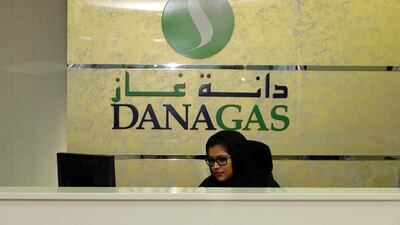The controversy over Dana Gas’s US$700 million sukuk refinancing rolls on, despite attempts by management to mollify its sukukholders.
The Sharjah-based gas company’s chief executive, Patrick Allman-Ward, on Thursday broadcast a statement via an open phone call aimed at “the wider sukukholder group”, setting out the company’s rationale for its recent legal actions and sketching out some terms for a refinancing. The company did not entertain questions, citing ongoing legal proceedings.
Though Mr Allman-Ward insisted the company aims to bring clarity to Sharia compliance for investors, some experts argue that the Dana Gas situation has only underlined the legal murkiness of the nascent sukuk market. This includes determining which jurisdiction holds sway, namely the UAE or English courts.
On Wednesday, the judge in the English High Court in London extended Dana's injunction to later in the month subject to restrictions, which include barring it from selling assets, paying dividends or raising finance above a certain limit. It may go to trial there in September if it isn't resolved.
“This will be a landmark decision for the industry,” says Khalid Howladar, founder of Dubai credit rating consultancy Accreditus, and former global head of Islamic finance at Moody’s Investors Service.
Dana Gas has been in a testy standoff with representatives of its sukukholders since May, when it said it wouldn’t be able to repay on time this year, and sought to negotiate a refinancing on less favourable terms.
The most controversial aspect has been its move on June 13th to have a court in Sharjah have its two outstanding mudarabah-type sukuk declared non-compliant with Sharia law.
Mr Allman-Ward in the call said that “compliance issues with regard to the current sukuk documents and instruments were identified by our legal advisers...as part of our due diligence ahead of sukuk restructuring discussions.”
Though he denied it in the call, representatives of the sukukholder group have accused the company of taking this unprecedented step as a ploy to avoid a declaration of default, as happened during the company's previous sukuk refinancing, when Dana Gas had to agree to terms on its outstanding sukuk that the company now argues are too onerous.
Mr Allman-Ward argued that Dana wants to offer investors a sukuk that can be deemed legal under current Sharia thinking, but that is questionable, says Mr Howladar.
“There are a number of Islamic structures that possess equity, profit-share and/or asset-backed features in form but not substance,” he says. “Dana [said that] four advisers...noted the current structure was not compliant with an 'asset management' type mudarabah structure. This was always true if you looked hard enough and the same is unfortunately true of many other modern structures.”
On the jurisdiction issue, Mr Allman-Ward emphasised that the English law in the sukuk documents “is part and parcel of the umbrella mudarabah agreement,” implying that UAE law should take precedence when determining the legality of the Islamic instrument.
Mr Howladar thinks otherwise. He points out that the sukuk offer document stated that “prospective investors are reminded that Dana Gas has agreed under the English Law Documents to submit to the jurisdiction of the courts of England. In such circumstances, the judge will first apply English law rather than Sharia principles in determining the obligations of the parties.”
Another aspect is whether the company itself will be determined to be Sharia-compliant under its terms of incorporation. This was a key aspect of a previous case involving The Investment Dar Company of Kuwait (TID) seven years ago when the question of its explicitly Sharia articles of association precluded it from anything resembling an interest-bearing transaction.
“In the case in TID, the judge had taken exactly this view and so ordered the immediate repayment of principle but not interest/profit. The question of interest was never resolved, leaving it uncertain,” he says. “Dana [Gas] has not applied this rationale to the restructuring but the Sharia nature of Dana [if, indeed, it is determined to be] could create a new channel of Sharia-compliant exposure for lenders/creditors.”
It's not clear, he says, whether the UAE courts will see Sharia compliant nature of sukuk as something that is there for investors or to shield the borrower. The UAE regulatory bodies are young (the Higher Sharia Board for Banking and Finance was set up only in May) and have so far not weighed in to the matter
Mr Howladar echoes Dana Gas when he says: “a speedy consensual restructuring would be best for all parties and the market." However, he adds, “damage has already been done to confidence in the sukuk market.”
"The case underlines the need for more guidance and harmonisation in the Gulf's Islamic finance market and for sukuk specifically," said Michael Gifferty, president of the Gulf Bond and Sukuk Association.

